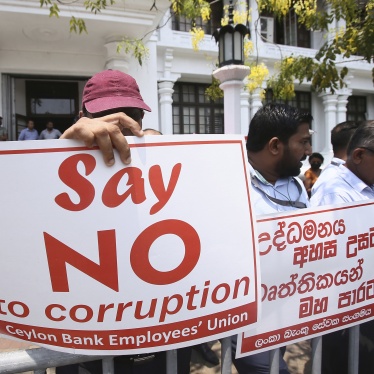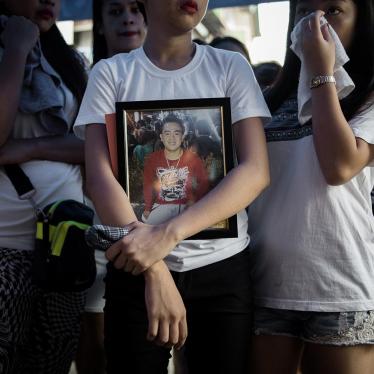The European Bank for Reconstruction and Development’s new draft Environment and Social Policy weakens the Bank’s existing safeguards on human rights, according to a group of civil society organisations. The Bank and its member States must reconsider this backward step. They should use this opportunity to put in place policies and systems to ensure that the Bank takes all necessary steps to prevent it from causing, contributing to or exacerbating human rights violations.
Commitment to Human Rights Law Effectively Removed
The Bank must be guided by the Agreement Establishing the European Bank for Reconstruction and Development (EBRD), which commits the Bank to fundamental principles including the rule of law and respect for human rights. The Bank also has a responsibility to act consistently with the obligations of its member States under international human rights law.
However, the draft policy takes several steps back from the Bank’s existing human rights commitments. Significantly, it eliminates language present in the current policy which states that the “EBRD will not knowingly finance projects that would contravene country obligations under relevant international treaties and agreements related to environmental protection, human rights, and sustainable development….” Instead, the draft only commits the Bank to “where appropriate, seek to structure the projects it finances” to be guided by relevant principles and substantive requirements of EU and international law. Under the draft policy, projects funded by EBRD will only be required to follow “good international practice” rather than international environmental and human rights law and standards. The previous text should be retained in the policy and the term “knowingly” replaced with a commitment for the Bank to take every necessary step to become aware of potential negative impacts that may contravene country obligations under international law and its own responsibility to respect human rights.
Both the existing and draft policy are narrowly defined as they omit any reference to international customary law and prevailing international standards as benchmarks. Under the draft policy, the Bank’s assessment process could avoid considering whether projects are consistent with international treaties binding the relevant country, thus seeking to comply with human rights only when the Bank wishes to do so.
The revised policy should include an express commitment that the Bank will uphold international human rights in all of its operations and will not support activities that are likely to cause, contribute to, or exacerbate human rights abuses The policy should also make clear that the Bank will take appropriate action to ensure an effective remedy where the projects it finances cause or contribute to human rights abuses.
Finally, the Bank is a major lender to corporations. Although one of the changes proposed is specific recognition of the responsibility of business to respect human rights, the policy does not put in place systems to ensure that clients actually respect human rights in projects supported by the Bank. The policy should be revised to commit the Bank to require its private clients to comply with relevant international standards, such as the UN Framework and Guiding Principles on Business and Human Rights, and to respect human rights in practise. The Bank should only provide funding to companies that commit to and show respect for human rights.
No Progress on Transparency and Disclosure
There are very limited amendments proposed in the Public Information Policy, which has remained largely unchanged for many years. In contrast to the EBRD, other multilateral development banks—including the World Bank and its private sector lending arm the International Financial Corporation, the African Development Bank, the Asian Development Bank, and the Inter-American Development Bank—have made considerable reforms to their policies to reflect increased public demand for transparency and accountability.
The EBRD’s impending implementation of the International Aid Transparency Initiative (IATI) is welcome. However, the IATI framework will only require the EBRD to make publicly available limited information about disbursements, but will not change any other obligations regarding access to information held by the Bank.
The draft Public Information Policy does not commit the Bank to disclose information on social and environmental appraisals of projects. Although the draft states that it is based on a presumption of transparency, this is undermined by an overly wide and extensive description of confidentiality that would prevent disclosure in many cases.
One example is exemption 1.1 referring to “documents intended for internal purposes only, or classified under the Bank’s internal classification regime as confidential.” Such exemptions should be limited to information, the disclosure of which would cause significant harm, and should be subject to a stronger public interest test. In addition, the policy sanctions non-disclosure if there is a confidentiality agreement with the client, in which case information can only be disclosed to the public if the client agrees. Advance publication of social and environmental appraisals should be required; if potentially affected people do not have access to such information they may be unable to raise relevant concerns about projects before the Bank decides whether or not to fund them. According to the draft policy, the EBRD will only disclose “confidential” information in exceptional circumstances where the Bank considers it necessary in order to “avert imminent and serious harm to public health or safety and/or imminent and significant harm to the environment.” There is no justification for such a stringent requirement for disclosure of information deemed confidential. This is in stark contrast to the World Bank’s policy to disclose information deemed confidential “if the Bank determines that the overall benefits of such disclosure outweigh the potential harm to the interest(s) protected by the exception(s).”
The policy does not provide for public disclosure of Board votes and statements on decisions relating to Bank policies and projects. This makes it difficult, if not impossible, to ascertain whether Member States are complying with their obligation to uphold their human rights obligations in their conduct within the Bank.
Lack of Human Rights Due Diligence
The draft Environment and Social Policy’s treatment of the environmental and social assessment process fails to expressly consider human rights. Environmental and social impact assessments rarely identify, assess, or address the full range of human rights impacts a project is likely to have. The Bank should explicitly integrate human rights considerations into its overall project appraisal. It should explicitly require human rights due diligence so as to ensure that the Bank does not support activities that will cause, contribute to, or exacerbate human rights violations. However, the draft policy appears to step backward in this regard. Both the current and draft policy state that the EBRD may refrain from financing a proposed project on environmental or social grounds. However, the current draft deletes an explanation that one example of when the EBRD may refrain from financing is “when a proposed project fails to address environmental and social issues in a satisfactory way and cannot be expected to meet the requirements set out in the applicable PRs [Performance Requirements] of this Policy over a time frame considered reasonable by the Bank, or where residual impacts remain unacceptable.” Such language should be reintroduced and strengthened. The policy should clearly state that a client’s previous human rights record shall be taken into account in project appraisals, and that human rights abuses in the context of a Bank funded project may be a bar to future lending unless that client can show that it has done all that it can to ensure the infringements are adequately remedied.
Unlike the practice of the World Bank, the draft policy requires the EBRD simply to review the social and environmental impact assessments prepared by clients for their own projects. There is a serious conflict of interest if the client, who stands to benefit if the project is approved, is delegated the responsibility by the EBRD for assessing the potential and actual impact for the EBRD. It is unacceptable for the EBRD to distance itself from its responsibility for the impacts of its funding. The lack of active engagement by the Bank in conducting the assessment is made worse because potentially affected people are given neither the necessary information nor the opportunity to raise concerns about projects at an early stage in the Bank’s decision-making process. As a result, they are unable to participate in decisions as to how potential negative impacts can be addressed early on and managed.
Furthermore, the draft policy should require the Bank to ensure that businesses it finances implement best practice for human rights due diligence. This includes: a human rights policy, a human rights impact assessment when the risk of a human rights abuse is identified, monitoring and reporting on implementation of human rights due diligence processes, and access to effective remedies. The Bank should require its clients to act in line with widely-accepted standards on business and human rights, as reflected in the UN Framework and Guiding Principles on Business and Human Rights, otherwise it risks providing support to projects linked to human rights abuses.
In addition, the new draft policy creates the possibility for environmental and social project appraisals to be carried out after Board approval of the project and signing of financial agreements. This is too late in the process—it would exclude public participation at the decision-making stage and effectively sends a signal to clients that they can treat these appraisals as a formality.
Only Partial Progress on Protection against Forced Evictions
The draft policy has a welcome new requirement that the Bank will not knowingly finance projects which either involve or result in evictions that are contrary to international human rights standards—the only firm human rights commitment contained in the draft. However, the term “knowingly” should be replaced with a commitment for the Bank to take every necessary step to become aware of potential forced evictions that may be a result of projects that it supports.
Disappointingly, the draft continues to indicate that resettlement sites need comply with only one or more of the seven requirements of the right to adequate housing. Thus, for example, it would permit evicted people to be resettled in metal containers in areas without employment options provided that only one of the other criteria was met. International human rights standards require that resettlement fulfils all the criteria of the right to adequate housing: (a) Legal security of tenure, (b) Availability of services, materials, facilities and infrastructure; (c) Affordability, (d) Habitability, (e) Accessibility, (f) Safe location allowing access to employment options, health-care, schools, and other social facilities (g) Cultural adequacy.
In addition, the draft policy does not prohibit Bank financing of a project where forced evictions have already taken place and there has been no attempt to establish a process to provide appropriate redress for victims. The EBRD should require clients to comply with the UN Basic Principles and Guidelines on Development-based Evictions and Displacement and the UN Guiding Principles on Internal Displacement. The policy removes an existing provision requiring legal assistance for displaced persons. At the London consultation, Bank staff indicated that this was not intentional. It is important that this provision is retained.
Restrictive Definition of Indigenous Peoples
The draft policy does not respect the principle of self-identification of indigenous peoples, instead making their recognition as a distinct indigenous group dependent on “recognition by others.” The draft policy recognises that indigenous peoples may have been forcefully removed from their lands, but requires that removal must have happened “within the concerned group members’ lifetime,” in order for those peoples to continue to be identified as indigenous. There is no justification for such a limitation.
Gaps in the Complaints Mechanism Policy
For the EBRD’s Environment and Social Policy to be effective, it is necessary that the Project Complaint Mechanism (PCM) is properly resourced and able to effectively address the complaints and concerns of people negatively affected by EBRD projects. However, under the draft PCM policy, the window for complaints is too narrow and is not on par with the practice of other international financial institutions’ accountability mechanisms. Complainants requesting a review of compliance with the EBRD's policies (compliance review) can only file a complaint after the project has been approved, even though the EBRD may carry out substantial due diligence and formulate key environmental and social documentation prior to approval. This deprives complainants of an important opportunity to prevent the escalation of conflict and mitigate adverse impacts from the outset. Further, complaints for compliance review cannot be filed after the last disbursement of funds. Complainants requesting problem-solving, in which the PCM brings the parties together to resolve the conflict, cannot file a complaint later than one year after the final disbursement of funds. Yet, adverse impacts may not become evident until much later, and conflicts between affected persons and the EBRD’s client can occur throughout the life of the project.
The draft policy does not allow complainants sufficient opportunity to comment at key decision points in the process. For example, complainants are now excluded from commenting on the formulation of the Management Action Plans, which set out the remedial action the EBRD and/or its client will take to address compliance failures, even though their perspective is crucial in determining whether such action will be adequate and effective. The exclusion of, or failure to formalise, opportunities for complainants to comment on findings and decisions affecting them carries the costly risks of incorrect findings and failure to adequately address any negative impacts on human rights raised in the complaint.
This statement is accompanied by three case studies produced by Amnesty International and Bankwatch demonstrating how the Bank’s failures to ensure effective safeguards has harmed the human rights of people living in the vicinity of particular Bank projects in Belgrade and Kolubara District, Serbia,and in Baie Mare, Romania.







